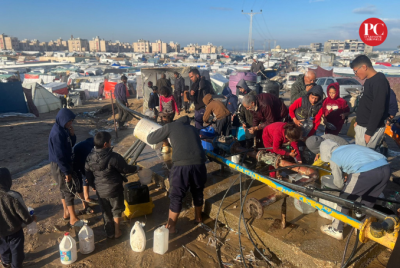Another Indefensible U.S. Veto at the United Nations
Voting against a resolution calling for a humanitarian ceasefire is a vote for famine and mass death.

All Global Research articles can be read in 51 languages by activating the Translate Website button below the author’s name (only available in desktop version).
To receive Global Research’s Daily Newsletter (selected articles), click here.
Click the share button above to email/forward this article to your friends and colleagues. Follow us on Instagram and Twitter and subscribe to our Telegram Channel. Feel free to repost and share widely Global Research articles.
Big Tech’s Effort to Silence Truth-tellers: Global Research Online Referral Campaign
***
The U.S. used its veto at the UN Security Council for the third time in this war to block a call for an immediate ceasefire:
The U.S. vetoed an Algerian proposal at the United Nations Security Council that called for a humanitarian cease-fire in Gaza, saying that a cessation of hostilities without securing the release of hostages in Hamas’s captivity would only prolong the conflict.
The U.S. circulated a draft resolution ahead of the vote calling, instead, for a temporary cease-fire in Gaza “as soon as practicable” and in tandem with the release of all hostages taken on Oct. 7, as the Biden administration increasingly clashes with the Israeli government over the conduct of the war.
The Biden administration’s hostility to a humanitarian ceasefire in Gaza is indefensible. They once again bring lasting disgrace on themselves and on the United States with this latest veto. The need for a humanitarian ceasefire is obvious and overwhelming. Every humanitarian relief agency has been pleading for one for months for this reason. Voting against a resolution calling for a humanitarian ceasefire is a vote for famine and mass death.
Hundreds of thousands of people are already living in famine conditions. More than 30,000 Palestinians have been killed, more than 70,000 have been injured, the health care system has all but collapsed, and relief efforts are severely restricted. Under these circumstances, anything less than an immediate and extended ceasefire is completely inadequate to address the needs of the civilian population. An immediate ceasefire is also the best chance that the remaining hostages have to survive and to be released. Putting off a ceasefire until it is “practicable” (decided by whom?) likely means that it will be put off indefinitely. The administration’s preferred solution has so many caveats and conditions attached that their temporary ceasefire would probably never happen.
The U.S. is still providing cover to the Israeli government after it has spent more than four months inflicting collective punishment on the entire population of Gaza with devastating effect. While the administration may claim to oppose an Israeli ground assault in Rafah, it refuses to do any of the things that would put meaningful pressure on Netanyahu and his allies to get them to stop. When presented with an opportunity to endorse a humanitarian ceasefire, the U.S. could have at least abstained to signal its dissatisfaction with Netanyahu if there was anything to signal, but instead our ambassador vetoed it. The U.S. won’t lift a finger to prevent catastrophe in Gaza, and instead it actively opposes the states that are trying to act. There is nothing surprising about this, but it needs to be stated clearly all the same.
A temporary ceasefire would be better than nothing, but it would not be enough to prevent mass starvation. Conditions have already been allowed to deteriorate so much that many people that have been weakened by hunger and disease will still perish even if the fighting stopped tomorrow. Further delay in halting the campaign doom tens and eventually hundreds of thousands of people to death from starvation and disease. These are deaths that can be prevented, but they won’t be if the U.S. keeps protecting Netanyahu’s government and its atrocious war.
The administration’s draft resolution calls for a “viable plan” for protecting civilians in Rafah in the event of a major Israeli operation, but there won’t be any such plan because it isn’t possible to launch a major military operation that protects civilians in an area where more than a million people have crowded together to find refuge from the slaughter. Biden keeps wanting to split the proverbial baby while pretending to care about the welfare of the child, but it can’t be done.
The ambassador’s defense of the U.S. veto is an insult to the intelligence of people everywhere. Ambassador Thomas-Greenfield reportedly said that proposals like the the Algerian-sponsored resolution “aren’t conducive to a sustainable peace and would instead empower Hamas.” This is just mindless repetition of the same talking points that the administration has used since October. Extremists and rejectionists thrive on conflict, so a ceasefire would deal a blow to Hamas by depriving it of a conflict. Even if a humanitarian ceasefire doesn’t lead to a sustainable peace right away, it would prevent massive loss of innocent life. Opposing peace in the name of some imaginary “sustainable peace” in the future is as cynical as it gets.
Even more insulting is the ambassador’s claim that ceasefire proposals like this one “deprive Israelis and Palestinians of the “security, dignity and freedom” they desire.” When you cast a vote against a humanitarian ceasefire, you are declaring to the world that you have no interest in the security, dignity and freedom of Palestinians, and you have also said that you don’t care whether they live or die. The rest of the world sees the U.S. position for what it is, and no one is buying the administration’s absurd spin.
*
Note to readers: Please click the share button above. Follow us on Instagram and Twitter and subscribe to our Telegram Channel. Feel free to repost and share widely Global Research articles.
Featured image: Palestinians line up to fetch some water in a refugee camp in Gaza. (Photo: Mahmoud Ajjour, The Palestine Chronicle)

